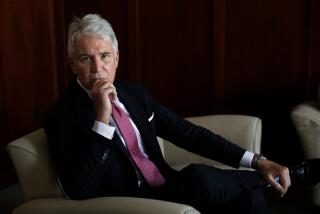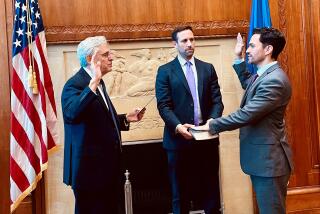Ashcroft Wielded Rare Power as Attorney General
- Share via
WASHINGTON — In his five-page, handwritten letter of resignation to President Bush, U.S. Atty. Gen. John Ashcroft declared that “the objective of securing the safety of Americans from crime and terror has been achieved.”
Whether that turns out to be true or not, Americans are going to be debating the cost of Ashcroft’s efforts in the war on terror for years to come.
To the faithful, Ashcroft was a hero, keeping the nation safe by averting a second terrorist attack on his watch. Along the way, he oversaw a drop in the nation’s violent crime rate to a 30-year low and spearheaded an aggressive crackdown on corporate criminals. The longtime National Rifle Assn. member even managed to dramatically increase the number of gun prosecutions.
To his critics, Ashcroft personified how the nation had veered wildly off course, sacrificing fundamental values for a degree of national security that in many ways is illusory and uncertain. Along the way, he alienated civil-liberties groups, as well as conservative thinkers, judges, and -- perhaps to his ultimate detriment -- some of the president’s top political aides.
“I think John Ashcroft is one of the most powerful -- if not the most powerful -- and effective attorneys general in the history of this nation,” said Viet Dinh, a Georgetown University law professor, who helped draft the Patriot Act as a top Ashcroft aide in the weeks after the Sept. 11 attacks.
The American Civil Liberties Union, which has compared Ashcroft’s embrace of those new powers to the Red scares launched by a predecessor in the early 1920s, expressed relief at news of his imminent departure, calling him “one of the most divisive forces in the entire Bush administration.”
From the moment Bush nominated him, Ashcroft seemed destined to have a controversial tenure. Even the circumstances of his appointment were bizarre: rescued from near-certain political obscurity after losing a hotly contested U.S. Senate race in Missouri to a dead man.
He endured a grueling four-day confirmation battle in the Senate, where he received the most negative votes ever cast against a nominee for attorney general.
He was scorned as an instrument of the far right, in part because of his devout religious views. Once ensconced on the fifth floor of the Justice Department, he began conducting regular prayer meetings in his office with staff members.
But early in his tenure, terrorists attacked New York and Virginia, and President Bush instructed Ashcroft: “Don’t ever let this happen again.” That launched Ashcroft on a mission of a different sort as the government swept up hundreds of young Arab men and jailed them for months or longer.
According to the Justice Department, that effort has yielded criminal charges against 368 people, including 194 convictions. The department says that under Ashcroft, it has dismantled terrorist operations and dried up their funding across America.
But most of those cases were immigration violations, not terrorism. And when the department actually went to court, its record was decidedly mixed. The first verdict the department won in a major terrorism case unraveled in Detroit this year amid evidence that his prosecutors withheld evidence and engaged in other misconduct. The Detroit judge even sanctioned Ashcroft for violating a gag order by discussing the case during one of his many news conferences.
His fervor for political theater proved to be a source of tension with White House staffers, who grew concerned at times that Ashcroft was attempting to grab the limelight at the expense of the president.
His management style created other problems. He centralized control over the charging decisions of federal prosecutors, even overruling them on occasions when they were reluctant to seek the death penalty. He started a list of federal judges whom he considered to be weak when it came to sentencing.
Ashcroft staffed his office of legal counsel with conservative political appointees who, advising the Pentagon, spelled out a strikingly broad view of White House power that freed the president and the military from the federal law and international treaties that barred the use of torture.
Legal experts said that, as a historical figure, Ashcroft was highly unusual, partly because of the circumstances that were thrust upon him, but also because of his own ardent nature.
“There have been inconspicuous attorneys general. There have been very idealistic ones,” said Robert Weisberg, a professor at Stanford law school. “Ashcroft is close to unique. He was sort of a missionary -- a zealot.”
Ashcroft, who was hospitalized this year with a severe case of pancreatitis, said in his letter to Bush that he believed that the department “would be well-served by new leadership and fresh inspiration.” He plans to serve until his successor is confirmed by the Senate.
“I believe that my energies and talents should be directed toward other challenging horizons,” he wrote.
Ashcroft has ruled out another run for elected office. Friends say he may be interested in teaching or running a small college.
In a parting statement to Justice Department employees, Ashcroft expressed thanks for their “awe-inspiring” efforts.
Citing Scripture, he also expressed his “gratitude to God for each day the sun rises on a free and safe America,” adding, “it would be the height of arrogance to assume we achieved this alone.”
*
(BEGIN TEXT OF INFOBOX)
Slings and arrows
Polls hint at John Ashcroft’s fluctuating standing in public opinion.
Jan. 15-16, 2001
Approve: 34%
Disapprove: 28%
Jan. 31-Feb. 2, 2003
Approve: 58%
Disapprove: 24%
Feb. 16-17, 2004
Approve: 42%
Disapprove: 36%
Source: Gallup polls
More to Read
Get the L.A. Times Politics newsletter
Deeply reported insights into legislation, politics and policy from Sacramento, Washington and beyond. In your inbox twice per week.
You may occasionally receive promotional content from the Los Angeles Times.










